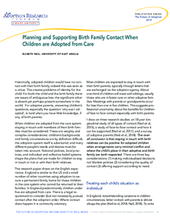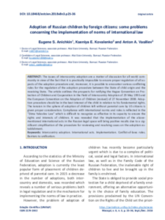Displaying 241 - 250 of 660
This open access article explores three related phenomena: first, the abandonment and institutionalization of children with disabilities in China that increased disproportionately in the 2000s; second, the important relationships between such abandonments, culture, economics, and politics in contemporary China; and third, the relationship between such abandonments, the increasing rates at which Chinese orphans with disabilities are being adopted to Western countries through Inter-country Adoption (ICA), and the global politics of ICA and disability.
When children are adopted from the care system staying in touch with members of their birth families must be considered.This research paper draws on the English experience.
The aim of this article is to develop proposals for the organization of a legal and regulatory framework in Russia, in accordance with the social and psychological needs of guardianship families and to identify the possibilities of the Ombudsman for the Rights of the Child to protect the rights of minors raised in guardianship families.
The purpose of this paper is to explore the wider context in which the UK national evaluation of the Adoption Support Fund (ASF) was delivered and raise concerns about the sustainability of the early outcomes.
This paper aims to highlight inequality in current adoption processes and procedures in England and Wales.
This article suggests that financial supports for adoption could be extended by introducing Child Development Accounts for children adopted from foster care in New South Wales, Australia.
This article outlines the prospects for ratifying the Hague Convention on Protection of Children and Cooperation in the Field of Intercountry Adoption of 29 May 1993 and the European Convention on the Adoption of Children (revised) of 27 November 2008.
This study provides an analysis of the ‘investigative turn’ in England by comparing two large cohorts of children, one whose fifth birthday was in 2011–12 and the other in 2016–17.
This article investigates the colonialist definitions of the terms “orphan” and “adoption”, contrasting them with how the traditional practice of child circulation in Fiji cared for orphaned children.
In this video, Dr. Kristen Cheney discusses how her work led her to study the growth of the Orphan Industrial Complex and its adverse effects on children, families, communities, and child protection systems.



